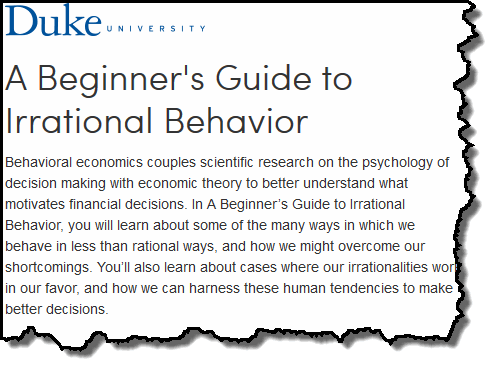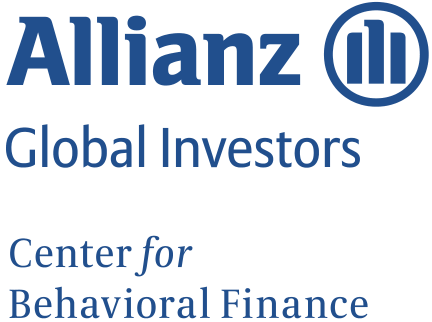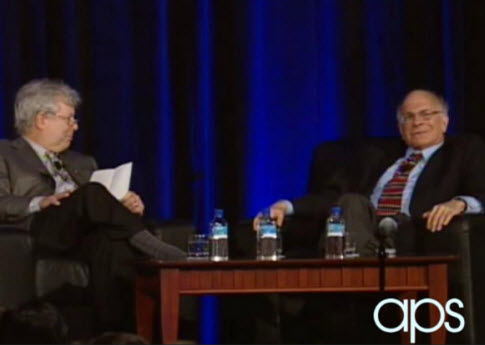FREE ONLINE COURSE ON IRRATIONAL BEHAVIOR BY DAN ARIELY

Dan Ariely writes:
Hello hello,
I wanted to let you know that I am running A Beginner’s Guide to Irrational Behavior for the second time, starting on March 11th. If you want to take the class again, I would be delighted to have you (and all your friends and family).
Sign up here: https://www.coursera.org/course/behavioralecon
Hope to see you again soon.
Irrationally Yours,
Dan Ariely
Want a teaser? Check out Dan’s teaser video.
Filed in
Conferences
 Subscribe
Subscribe to Decision Science News by Email (one email per week, easy unsubscribe)
ASSOCIATION FOR CONSUMER RESEARCH NORTH AMERICAN CONFERENCE

What: ACR 2014 North American Conference (aka ACR 2014)
When: October 23-26, 2014
Where: Baltimore, MD
Deadline: Friday, March 7, 2014, before midnight Central Standard Time (CST): Deadline for Special Sessions, Competitive Papers, Working Papers, and Roundtables.
Call for Papers: http://www.acrweb.org/acr/public/availability.aspx
Conference website: http://www.acrweb.org/acr/public/index.aspx
Conference email: acr2014@ivey.uwo.ca
We are delighted to welcome you to the 2014 North American Conference of the Association for Consumer Research, to be held at the Hilton Baltimore, from Thursday, October 23 through Sunday, October 26. The conference theme is Back to Fun. It is inspired by a desire to recognize the fun that is inherent in being a consumer behavior scholar and, especially, in being a part of this community. To that end, we will focus on research that inspires passion in its pursuers and field-building sessions that help protect that passion (or re-kindle it) for professors at all career stages. We will embrace the paradox that when we have fun and don’t take ourselves too seriously, we have a better chance at doing seriously rigorous and seriously interesting research.
Baltimore is an eclectic and charming waterfront city. The Hilton Baltimore is across the street from Camden Yards—the award-winning home of the Baltimore Orioles—and just one block off of Baltimore’s famous Inner Harbor that features the National Aquarium, Port Discovery Museum, Chessie (sea monster) paddle-boat and speed-boat rentals, historic parks, street performers, and a bevy of restaurants and bars. Baltimore is served by an international airport (BWI), but is also only a one-hour drive from Washington Dulles International airport (IAD) for those traveling internationally. In other words, Baltimore is fun.
Conference Co-chairs:
June Cotte, Ivey Business School
Stacy Wood, North Carolina State University
Filed in
Jobs
 Subscribe
Subscribe to Decision Science News by Email (one email per week, easy unsubscribe)
SENIOR BEHAVIORAL FINANCE SPECIALIST POSITION

The Allianz Global Investors Center for Behavioral Finance was founded in 2010 with the goal of turning academic research into actionable ideas and practical tools that financial advisors and retirement plan sponsors can use to help their clients and employees make better financial decisions. To respond to growing demand, the Center is creating the role of Senior Behavioral Finance Specialist to work on the communication, presentation and implementation of our programs and to educate internal stakeholders and clients on behavioral finance more broadly.
This position reports to the Director of the Allianz Global Investors Center for Behavioral Finance, though the behavioral finance specialist will collaborate with the Center’s Chief Behavioral Economist, Prof. Shlomo Benartzi, and other academic advisors working with the Center.
Location: New York City, with significant travel requirement.
Key Job Responsibilities
- Serve as behavioral finance subject matter expert for sales and marketing teams and other internal AllianzGI stakeholders.
- Train internal employees on the Center’s behavioral finance programs.
- Present externally at client events and conferences.
- Provide input on the development of the Center’s programs.
- Write shorter pieces and contribute content for presentations.
Qualifications
- PhD in behavioral economics or related field
- Superb written and oral communication skills with ability to synthesize complex information and communicate it in an engaging way.
- Ability to engage effectively with a wide range of people, including senior executives, academics, sales people, and clients of various kinds.
- Capable of balancing priorities of simultaneous projects and demands.
Estimated Break-down of Responsibilities:
- 20% – keeping abreast of academic research and competitive landscape.
- 20% – content development.
- 50% – travel, giving talks, attending client meetings.
- 10% – responding to requests for information, inquiries, fulfilling other internal requirements, etc.
Those interested should contact Sarah Cossa, Allianz Global Investors HR, at Sarah.Cossa@allianzgi.com, and include a resume.
Filed in
Jobs ,
Programs
 Subscribe
Subscribe to Decision Science News by Email (one email per week, easy unsubscribe)
SUMMER SCHOOL ON SIMPLE SOLUTIONS FOR A COMPLEX WORLD, JUNE 10-17, 2014,

What: Summer Institute on Bounded Rationality
For Whom: Grad students and postdocs
When: June 10-17, 2014
Where: Max Planck Institute for Human Development in Berlin, Germany
Application deadline: March 16, 2014
Famous JDM Alumni of this summer school: Many, many
Apply before March 16, 2014 via the online-application form: http://bit.ly/1epf6sb
We invite talented graduate students and post-doctoral fellows to the annual Summer Institute on Bounded Rationality hosted by Gerd Gigerenzer (Center for Adaptive Behavior and Cognition) and Ralph Hertwig (Center for Adaptive Rationality). The Summer Institute will gather distinguished scientists and 35 talented young researchers from diverse backgrounds for a conversation focused on the importance of simple solutions to the complex problems of the modern world.
Participants will be given access to the fundamentals, the methods, and the most recent and cutting-edge research on bounded rationality in various talks and small-group workshops. They and the invited faculty will present their research and learn, practice, and discuss how the simple can outperform the complex. The interactive format of the summer institute includes debate sessions and panel discussions, leaving plenty of room for exchanges between established researchers and fellow young scholars.
PROGRAMM
Planned highlights of the program include talks and workshops by:
Gerd Gigerenzer ++ Ralph Hertwig ++ Thorsten Pachur ++ Henry Brighton ++ Jan Woike ++ Shenghua Luan ++ Mirjam Jenny ++ Uwe Czienskowski ++ Hansjorg Neth ++ Odette Wegwarth ++ Juliane Kämmer ++ Tim Pleskac ++ Jens Krause ++ Peter Todd ++ Florian Artinger ++ Till Grüne-Yanoff ++ Markus Feufel …
COVERED EXPENSES
Participants will be housed in an attractive hotel in the city and will be given a stipend to cover part of the traveling expenses — intercontinental flights will be reimbursed up to 300 EUR (400 USD) while European travel from outside of Germany up to 150 EUR (200 USD).
INTERESTED?
For more details on the Summer Institute and the application process see the website http://bit.ly/1eT6d5f
Feel free to direct questions to us via email: si2014@mpib-berlin.mpg.de
TRYING TO ESCAPE THE LONG TAIL OF THE UNIMPACTFUL

We once heard ‘when you invent a system, you invent the game that plays that system’. We remember this from our time in industry. No matter how you’d choose to compensate salespeople, they’d find the loopholes and exploit them. Academics are no different. Enjoy this Nature News piece “Brazilian citation scheme outed“. The tale takes place in Brazil, but we’ve heard about shenanigans in other countries as well. No matter how you choose to measure academic output, academics will game it.
Filed in
Ideas
 Subscribe
Subscribe to Decision Science News by Email (one email per week, easy unsubscribe)
ENEGRY SAVING STREETLIGHTS THAT BRIGHTEN WHEN THEY SEE YOU COMING
The Dutch love their roadside sensors. We at Decision Science News learned this when we got a big fat speeding ticket at the Choice Symposium in Nordwijk last year. Now those clever Dutch have found another way to make the roads safer, streetlights that brighten up when they see you coming, as discussed in this Salon article. It saves electricity and reduces light pollution, sort of a no-brainer now that the technology is there. The smart lights can even detect a bicycle or a pedestrian.
Here’s a video that shows it in action.
With so much emphasis on behavioral nudges, it is nice to remind ourselves that much can be done by leaving behavior alone and making the everyday environment (which is largely artificial anyway) smarter.
Story H/T Adam Alter.
THALER INTERVIEWS KAHNEMAN

When your field of research is judgment and decision making, it’s not every day you see a 45 minute interview on your topic. Or every week. Or every year. So when we were sent this interview featuring two JDM giants, Richard Thaler and Nobel Laureate Daniel Kahneman, we knew we had to run it, even if it is from 2008.
Enjoy it: who knows when you’ll get to see another interview on judgment and decision-making (aka behavioral economics).
Filed in
Conferences
 Subscribe
Subscribe to Decision Science News by Email (one email per week, easy unsubscribe)
DEADLINE SOON: JAN 15, 2014

Submissions for papers for both the 14th biennial conference on Behavioral Decision Research in Management (BDRM) and The Greater Good pre-conference will close on January 15, 2014.
Please submit via http://bdrm2014.org/bdrm2014-submissions/
BDRM is the leading conference for behavioural research conducted in business schools and will be held at London Business School, London, UK, from on July 17-19, 2014. We encourage submissions of original work in all areas of behavioural research including, but not limited to, decision making, consumer behaviour, experimental and behavioural economics, decision analysis, behavioural finance, organizational behaviour, negotiation, behavioural strategy, behavioural operations research, behavioural accounting, and medical and legal decision making.
We are glad to announce the following keynote speakers:
George Loewenstein, Herbert A. Simon Professor of Economics and Psychology, Carnegie Mellon University
David Halpern, Director of the Cabinet Office Behavioural Insights Team (the ‘Nudge Unit’)
“The Greater Good” pre-conference in partnership with the Journal of Marketing Research will focus on behavioural decision research that can contribute to understanding and fixing pressing social needs. The pre-conference will take place at London Business School on July 17, 2014 and will end before the BDRM evening welcome reception.
The conference website http://bdrm2014.org/ provides all conference related information, including the Calls for Papers. For any additional queries please email us at bdrm2014@london.edu.
SEE YOU IN LONDON IN THE SUMMER OF 2014!
Simona Botti, London Business School
David Faro, London Business School
Yuval Rottenstreich, Rady School of Management, UC San Diego
PUTTING VEGGIES ON THE PLATE MEANS MANY GET THROWN AWAY

We saw in our last posts that using double sided printing and cover sheets by default saves a lot of paper. This week we see a case in which defaults are effective, but have a costly drawback. Abstract says it all.
REFERENCE
Just, David & Joseph Price (2013). Default options, incentives and food choices: evidence from elementary-school children. PUBLIC HEALTH NUTRITION, 16 (12):2281-2288.
ABSTRACT
Objective: To examine whether requiring children to place fruits and vegetables on their lunch trays increases consumption of these items. Design: Observational study that exploited naturally occurring variation between two school districts and a pre-post observational study at schools that changed their lunch policy mid-year.
Setting: Fifteen elementary schools from two school districts, one requiring students to place a fruit or vegetable on their tray and one that does not. In addition, three schools that implemented a default option part way through the school year.
Subjects: Students at eighteen elementary schools (41,374 child-day observations) across the two experiments.
Results: Requiring that fruits and vegetables be placed on each child’s tray increased the fraction of children who ate a serving of fruits or vegetables by 8 percentage points (P < 0.01) but led to an extra 0.7 servings being thrown away per lunch served (P < 0.01). The default option approach cost $US 1.72 to get one additional child to eat one serving of fruits and vegetables for 1 d. However, when default options were combined with a small rewards programme the efficacy of both interventions increased.
Conclusions: A default option, as a stand-alone programme, had only a limited impact on fruit and vegetable consumption but was much less cost-effective than other approaches. Schools requiring children to take fruits and vegetables with their lunch might consider adopting additional interventions to ensure that the additional items served do not end up being thrown away.
SUMMER INSTITUTE ON BOUNDED RATIONALITY 2014

Date: June 10-17, 2014
Location: Max Planck Institute for Human Development in Berlin, Germany
Application deadline: March 9, 2014.
We invite talented graduate students and post-doctoral fellows to the annual Summer Institute on Bounded Rationality hosted by Gerd Gigerenzer (Center for Adaptive Behavior and Cognition) and Ralph Hertwig (Center for Adaptive Rationality). The Summer Institute will gather distinguished scientists and 35 talented young researchers from diverse backgrounds for an interdisciplinary summer school on the importance of simple solutions to the complex problems of the modern world.
Participants will be given access to the fundamentals, the methods, and the most recent and cutting-edge research on bounded rationality in various talks and small-group workshops. They and the invited faculty will present their research and learn, practice, and discuss how the simple can outperform the complex. This also involves debates and questions, allowing to network with internationally renowned researchers and fellow young scholars.
Planned highlights of the program include talks and workshops by:
Gerd Gigerenzer ++ Ralph Hertwig ++ Thorsten Pachur ++ Henry Brighton ++ Jan Woike ++ Shenghua Luan ++ Mirjam Jenny ++ Uwe Czienskowski ++ Hansjorg Neth ++ Odette Wegwarth ++ Juliane Kämmer ++ Tim Pleskac ++ Jens Krause ++ Peter Todd ++ Florian Artinger ++ …
COVERED EXPENSES
Our stipends cover accommodation including breakfast. The accommodation will be organized by us. The stipend also covers part of the travelling expenses depending on your means of transportation: Up to 300 EUR for Intercontinental flights and 150 EUR for European travel from outside of Germany.
INTERESTED?
Apply now via the online-application form.
For more details on the Summer Institute and on the application process see our website:
Feel free to direct questions to us via email: si2014@mpib-berlin.mpg.de
The application deadline is March 9, 2014.
We look forward to your applications!
With best regards from Berlin,
The organization committee
Organizing Team
Summer Institute on Bounded Rationality 2014
Simple Solutions for a Complex World
si2014@mpib-berlin.mpg.de
Jointly organized by
The Center for Adaptive Behavior and Cognition
& The Center for Adaptive Rationality
at the Max Planck Institute for Human Development
 Subscribe to Decision Science News by Email (one email per week, easy unsubscribe)
Subscribe to Decision Science News by Email (one email per week, easy unsubscribe)










